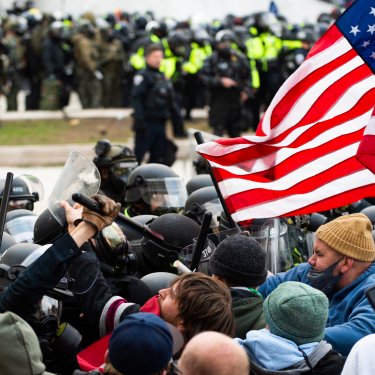Leaked January 6th Committee memo underscores tech platforms’ need for greater democratic safeguards

A recently leaked staff memo from the U.S. House Committee investigating the January 6, 2021 attacks on the U.S. Capitol details how social media companies failed to address threats of violence. Reporters Without Borders (RSF) is disappointed that the Committee chose to omit this memo from its final report, as it sheds light on many of the failures of major social media platforms used by organizers of the “Stop the Steal” rally.
Social media platforms, including Twitter, Facebook, and YouTube were widely used by organisers of the “Stop the Steal” rally in the United States which turned into the 6 January riot. According to the leaked U.S. House Committee staff memo, published by the Washington Post, employees at major social media sites warned their superiors about a rise in violent rhetoric on their platforms, but were ignored. “These groups were rife with incitement to violence, threats, hate speech, and misinformation about the election…Despite the knowledge that these groups had ties to violent actors, employee recommendations that the company take the problem more seriously were ignored or outright rejected,” the memo states.
It was also found that “Internal Facebook research describes how the 'Stop the Steal' movement was propagated by a small core of individuals…while strategically evading enforcement of platform policies”. Furthermore, these platforms circumvented their own established rules in order to allow violent content to remain online for fear of appearing to penalize certain political factions.
“The findings detailed in this memo will help us better understand how tech platforms like Facebook, Twitter, and YouTube were used to spread disinformation and organize the deadly attack on the Capitol in 2021,” explained Executive Director of RSF’s U.S. Bureau Clayton Weimers. “The memo reinforces what we already know: that the content moderation policies currently in place aren’t up to the task of preventing violent rhetoric online or physical violence in real life. We need real democratic safeguards and transparent policies to tame the chaos of the digital information space.”
The threat of violence jumping from screens to streets has not subsided. Since January 6, 2021, few concrete measures have been taken to prevent similar violent events being organized online. Twitter in particular, since Elon Musk’s takeover, has almost entirely eliminated already insufficient safeguards, including laying off the majority of its team working on platform safety and disbanding the Trust and Safety Council, of which RSF was a participant. Violent rhetoric on social media has also been linked to the attack on the Brazilian Supreme Court, Congress and presidential palace in Brasilia on January 8, 2023.
RSF has made concrete proposals to establish democratic safeguards to platforms like Twitter. The organization also launched the Forum on Information and Democracy, an international body meant to deliver concrete solutions to the chaos of the 21st century information space.
The United States is ranked 42nd out of 180 countries in RSF’s 2022 World Press Freedom Index.
